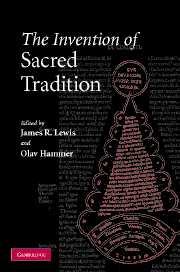Book contents
- Frontmatter
- Contents
- List of figures
- Notes on contributors
- Introduction
- 1 Scientology, scripture, and sacred tradition
- 2 “He may be lying but what he says is true”: the sacred tradition of don Juan as reported by Carlos Castaneda, anthropologist, trickster, guru, allegorist
- 3 The invention of sacred tradition: Mormonism
- 4 Antisemitism, conspiracy culture, Christianity, and Islam: the history and contemporary religious significance of the Protocols of the Learned Elders of Zion
- 5 The invention of a counter-tradition: the case of the North American anti-cult movement
- 6 “Heavenly deception”? Sun Myung Moon and Divine Principle
- 7 “Forgery” in the New Testament
- 8 Three phases of inventing Rosicrucian tradition in the seventeenth century
- 9 A name for all and no one: Zoroaster as a figure of authorization and a screen of ascription
- 10 The peculiar sleep: receiving The Urantia Book
- 11 Ontology of the past and its materialization in Tibetan treasures
- 12 Pseudo-Dionysius: the mediation of sacred traditions
- 13 Spurious attribution in the Hebrew Bible
- 14 Inventing Paganisms: making nature
- Index
- References
Introduction
Published online by Cambridge University Press: 22 September 2009
- Frontmatter
- Contents
- List of figures
- Notes on contributors
- Introduction
- 1 Scientology, scripture, and sacred tradition
- 2 “He may be lying but what he says is true”: the sacred tradition of don Juan as reported by Carlos Castaneda, anthropologist, trickster, guru, allegorist
- 3 The invention of sacred tradition: Mormonism
- 4 Antisemitism, conspiracy culture, Christianity, and Islam: the history and contemporary religious significance of the Protocols of the Learned Elders of Zion
- 5 The invention of a counter-tradition: the case of the North American anti-cult movement
- 6 “Heavenly deception”? Sun Myung Moon and Divine Principle
- 7 “Forgery” in the New Testament
- 8 Three phases of inventing Rosicrucian tradition in the seventeenth century
- 9 A name for all and no one: Zoroaster as a figure of authorization and a screen of ascription
- 10 The peculiar sleep: receiving The Urantia Book
- 11 Ontology of the past and its materialization in Tibetan treasures
- 12 Pseudo-Dionysius: the mediation of sacred traditions
- 13 Spurious attribution in the Hebrew Bible
- 14 Inventing Paganisms: making nature
- Index
- References
Summary
Modern societies present us with an ambivalent attitude toward the past. On the one hand, most of us are so much part of a culture of innovation that we tend to accord little power and importance to tradition. Being old-fashioned is an invective, whereas it is a virtue to be up to date. As Marx famously phrased it, in modern life all that is solid melts into air.
Yet, at the same time that the idea of change, innovation, and progress permeates so much of our society, there are areas of life where tradition reigns. A felt continuity with the past provides social institutions and private life with a sense of stability. Religion must surely be one of the domains where the habit of referring to hoary tradition is most prevalent. Ancient texts are passed on through the ages, accepted ways of interpreting them are taught to new generations of members, and rituals are performed according to age-old precedents.
In the dictionary sense of the word, tradition constitutes a set of inherited patterns of beliefs and practices that have been transmitted from generation to generation. In another sense, tradition can rest simply on the claim that certain cultural elements are rooted in the past. Claim and documented historical reality need not overlap. Indeed, in their classic study The Invention of Tradition, Eric Hobsbawm and Terence Ranger remind us that some of the best-known “ancient customs” are, in fact, quite recent innovations.
- Type
- Chapter
- Information
- The Invention of Sacred Tradition , pp. 1 - 17Publisher: Cambridge University PressPrint publication year: 2007
References
- 2
- Cited by



